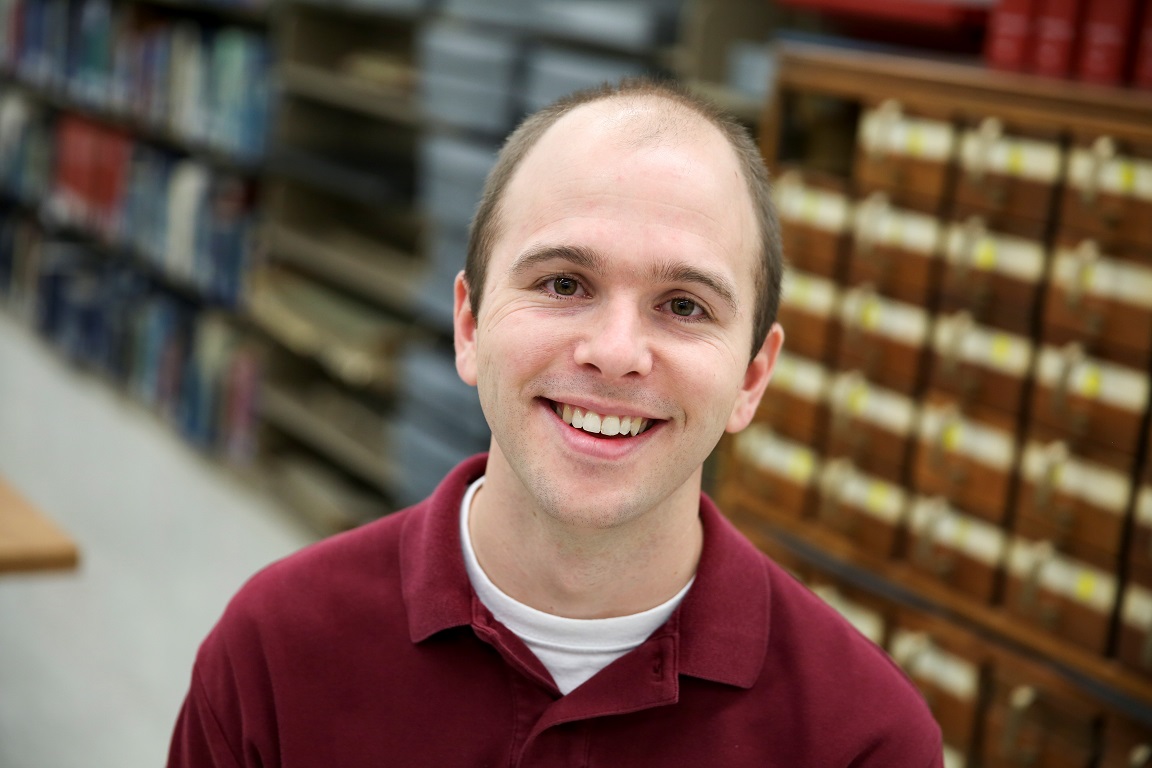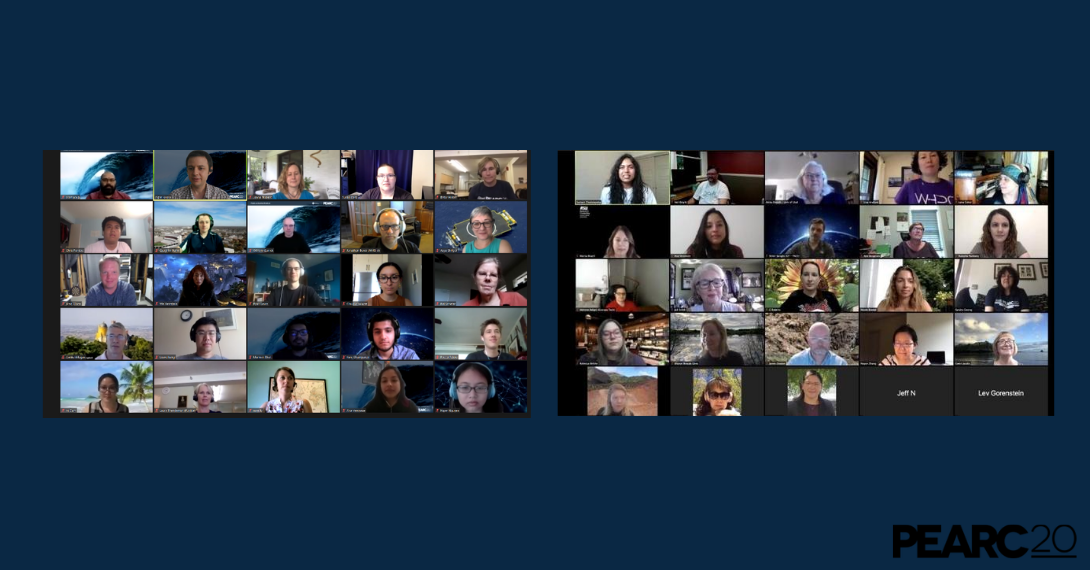Applications for the PEARC21 Student Program are no longer being accepted.
The ACM PEARC21 virtual student program (SP) begins Sunday, July 18, 2021, one day ahead of the general conference. Following training and orientations on Sunday, students can then attend workshops, tutorials, panels, and more on Monday through Thursday. Among SP highlights are an introduction to CI for beginners, a resume clinic, mentor-protege pairing, exhibitor Q&A, charity gaming, internship spotlight, and more. It’s five full days of professional development designed to help students envision themselves in research computing and data science (RCD) careers with academia, industry and government.
A few dozen students who attended the Science Gateways Community Institute (SGCI) HackHPC@PEARC21 Hackathon will attend the conference. The Hackathon concludes July 13, and winners will be announced during the PEARC21 awards ceremony on Thursday, July 22.
Sunday
(the conference schedule is in the Pacific time zone)
10-10:30 a.m.: Welcome and orientation: Co-Chairs Elizabeth Leake (STEM-Trek) and Alana Romanella (Virginia Tech).
10:30-10:40 a.m.: Coordinator Ashley Barker (ORNL) will provide an orientation to the Resume Clinic and “PitchIt” activities.
10:40-10:50 a.m.: Coordinator Ron Payne (UIUC) will provide an orientation to the Exhibitor Q&A activity.
10:50-11:00 a.m.: Mandy Terrill (OHSU) will explain how everyone can participate in Extra Life and other gaming activities.
 11-12:00 a.m.: “Hour of CI” with Eric Shook (U-Minnesota):
11-12:00 a.m.: “Hour of CI” with Eric Shook (U-Minnesota):
The Hour of CI project is a nationwide campaign introducing hundreds of diverse undergraduate and graduate students to cyberinfrastructure. Modeled on the “Hour of Code,” the Hour of CI project is building a sustainable learning community and scalable training environment to train learners at institutions ranging from R1 universities to two-year teaching colleges. The project is developing 17 interactive, online lessons for students and creating supplementary curriculum materials for instructors. Hour of CI lessons expose learners to cyberinfrastructure, establish conceptual foundations, and build a core set of skills to help them achieve Cyber Literacy for Geographic Information Science, which requires learners to be knowledgeable in eight core areas: cyberinfrastructure, parallel computing, big data, computational thinking, interdisciplinary communication, spatial thinking, geospatial data, and spatial modeling and analytics. The project lowers the barrier to entry for educators and students by building on a science gateway called the GISandbox to provide a cyberinfrastructure-enabled training environment accessible through a web browser for all Hour of CI lessons. See more information at hourofci.org.
Eric Shook (right) is an Associate Professor in the Department of Geography, Environment, and Society at the University of Minnesota and the Domain Champion for GIS for the NSF-supported Extreme Science and Engineering Discovery Environment (XSEDE). His research is focused on geospatial computing, which is situated at the intersection of geographic information science and computational science, with particular emphasis in the areas of cyberGIS, data-intensive spatio-temporal analytics and modeling, and spatially-explicit domain-specific languages. He is the lead for the Hour of Cyberinfrastructure project focused on helping learners build cyber literacy for GIScience (hourofci.org).
 12-1:00 p.m.: “Open Science Grid, High Throughput Computing and More,” Lauren Michael (UW-Madison). The Open Science Grid (OSG) is a consortium of researchers and research computing providers, aligned around the common vision to advance research through distributed high-throughput computing (dHTC) capabilities. In addition to developing technologies that large collaborations use for their own pools of distributed capacity, the OSG core team supports the Open Science Pool, a virtual cluster of capacity from more than 100 institutions available for open science. In the last year, researchers used more than 360 million core hours of computing via the Open Science Pool, where individual users have accessed up to thousands of concurrent cores and up to millions of annual core hours. Researchers with computations executable as numerous independent tasks can use this capacity from access points at their campus or via the OSG-operated OSG Connect Service for US-based researchers. Features and capabilities include easy expression and management of large numbers of compute jobs, support for large datasets and various software, and an obligate initial meeting with an OSG Research Computing Facilitator when requesting an OSG Connect account. The OSG team also provides services for campuses to share their local computing or data resources, and for supporting their own research community to use the Open Science Pool.
12-1:00 p.m.: “Open Science Grid, High Throughput Computing and More,” Lauren Michael (UW-Madison). The Open Science Grid (OSG) is a consortium of researchers and research computing providers, aligned around the common vision to advance research through distributed high-throughput computing (dHTC) capabilities. In addition to developing technologies that large collaborations use for their own pools of distributed capacity, the OSG core team supports the Open Science Pool, a virtual cluster of capacity from more than 100 institutions available for open science. In the last year, researchers used more than 360 million core hours of computing via the Open Science Pool, where individual users have accessed up to thousands of concurrent cores and up to millions of annual core hours. Researchers with computations executable as numerous independent tasks can use this capacity from access points at their campus or via the OSG-operated OSG Connect Service for US-based researchers. Features and capabilities include easy expression and management of large numbers of compute jobs, support for large datasets and various software, and an obligate initial meeting with an OSG Research Computing Facilitator when requesting an OSG Connect account. The OSG team also provides services for campuses to share their local computing or data resources, and for supporting their own research community to use the Open Science Pool.
1-2:00 p.m. Lunch break for those who are not involved with mentor-protege activities.
 2-3:30 p.m.: Internship Spotlight. Return to the Virginia Tech Zoom location (seven at 10 minute presentations plus 20 minutes discussion/Q&A).
2-3:30 p.m.: Internship Spotlight. Return to the Virginia Tech Zoom location (seven at 10 minute presentations plus 20 minutes discussion/Q&A).
3:30-3:45 p.m., Break
3:45-5:15 p.m.: Cybersecurity Careers Panel
5:15-6:00 p.m.: Meet the panelists/internship hosts (10) break-out rooms.
Monday
7:30-8:00 a.m. PST Morning and Evening Check-in Meeting (after conference concludes)
Student program committee members will be available to answer student questions, collect feedback, and record lessons learned. All who participate in the PEARC21 student program are required to attend these brief sessions.
Student program sessions are not scheduled on Monday so that all can take advantage of workshops and tutorials. Registering as early as possible is recommended. Anyone new to research computing will be comfortable participating in sessions that are marked appropriate for beginners. Education and outreach programs will appeal to grads and postdoctoral scholars who have teaching obligations.
Tuesday
7:30-8:00 a.m. PST: Morning and Evening Check-in Meeting (after conference concludes)
Student program committee members will be available to answer student questions, collect feedback, and record lessons learned. All who participate in the PEARC21 student program are required to attend these brief sessions.
10-11:00 a.m. PST: Exhibitor Q&A
12:30-2:00 p.m. Extra Life Gaming
1:30-3:00 p.m. PST: PitchIT Workshop (optional; limited seating)
Students who select to attend this program can fine-tune their elevator pitch with the help of student program committee members. An elevator pitch is a quick synopsis of someone’s background and experience. The reason it’s called an elevator pitch is that it should be short enough to present during a brief elevator ride. This speech is all about you: who you are, what you do, and what you want to do (if job hunting or pitching an idea). It’s useful at job fairs, networking events, mixers, poster presentations, conferences, and more! It is also a great way to introduce yourself to hiring managers. During this workshop, you will have the opportunity to craft a unique elevator pitch and “PitchIT” to committee members and invited guests. This workshop will be conducted in Zoom and participants are required to arrive a few minutes early. Once we begin, latecomers will not be allowed to enter.
Wednesday
7:30-8:00 a.m. Morning and Evening Check-in Meeting (after conference concludes)
Student program committee members will be available to answer student questions, collect feedback, and record lessons learned. All who participate in the PEARC21 student program are required to attend these brief sessions.
9:20-10:50 a.m. Student Competitions Panel (during the general conference)
12:30-2:30 p.m. PST: Student Posters
3-5:00 p.m.: Resume Clinic
Are you preparing your application for graduate school, an internship program, or perhaps a full-time position? Would you like to have your resume critiqued by a professional in the field? If so, you’ll enjoy our resume clinic which will take place on Wednesday, 3-5:00 p.m. PST. Twenty-minute time slots will be available on a first-come, first served basis. Be sure to upload your resume when registering; failure to do so could jeopardize your place in the queue if the activity is popular. Additional instructions will be sent to anyone who selects to participate when registering.
Thursday
7:30-8:00 a.m. PST: Morning Check-in Meeting
Student program committee members will be available to answer student questions, collect feedback, and record lessons learned. All who participate in the PEARC21 student program are required to attend these brief sessions.
Wrap-up Meeting following the conference general session
What is a virtual conference experience like? Ask Ana and Alexa!
“I was excited to attend the PEARC20 conference for the first time in 2020. Even in a virtual mode, the week was intense – almost as if I had attended in person,” said Ana Luisa Veroneze Solorzano (Federal University of Rio Grande do Sul, Brazil, left). For a day-by-day, first-hand account of PEARC20’s student program, read Ana’s blog on the STEM-Trek website.
PEARC20 Student Organizer Alexa Salsbury (Virginia Tech, right), when interviewed by Science Node, recognized that the virtual format may appeal to a broader range of personalities. She explained that most who attend PEARC have some computational skills, but the virtual format is especially comfortable for the more introverted conference-goers who may find that engaging others via instant message is easier than approaching them in person. PEARC uses a wide range of communication tools, including the toolkit within the conference platform, back-channel Slack, and Discord.
Watch this page for updates as they are announced, including the student program call for participation and submission deadlines.
PEARC21 Student Program Co-Chairs:
Elizabeth Leake (STEM-Trek)
Alana Romanella (Virginia Tech)
Student Program Committee:
Alper Kinaci (Northwestern University; Mentor-Protégé Chair); Mandy Terrill (Oregon Health & Science University; ExtraLife Chair); Ashley Barker (Oak Ridge National Laboratory; Résumé Clinic/PITCH-IT Workshop Chair); and Ron Payne (NCSA Program Manager, Project Management Coordination Office; Exhibitor Q&A Chair).
Training Subcommittee:
Sai Ramadugu (University of Iowa); Bryan Johnston (Centre for HPC South Africa); David Macleod (Centre for HPC South Africa); Linda Hayden (Elizabeth City State University; SGCI; Hackathon); Veronica Vergara Larrea (Oak Ridge National Laboratory); Je’aime Powell (Texas Advanced Computing Center; SGCI; Hackathon); and Eric Shook (University of Minnesota; Hour of CI).
Questions?
If you have questions, or require more information, please contact: [email protected]

